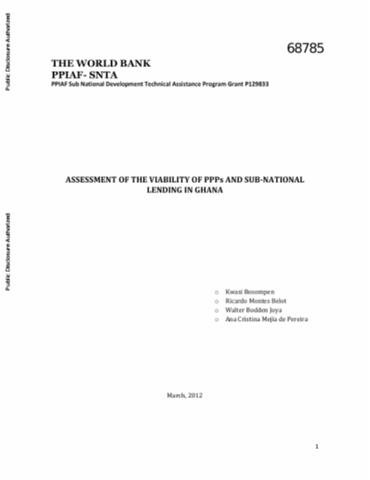The World Bank is a vital source of financial and technical assistance to developing countries around the world. We are not a bank in the ordinary sense but a unique partnership to reduce poverty and support development. The World Bank Group has two ambitious goals: End extreme poverty within a generation and boost shared prosperity.
- To end extreme poverty, the Bank's goal is to decrease the percentage of people living on less than $1.25 a day to no more than 3% by 2030.
- To promote shared prosperity, the goal is to promote income growth of the bottom 40% of the population in each country.
The World Bank Group comprises five institutions managed by their member countries.
The World Bank Group and Land: Working to protect the rights of existing land users and to help secure benefits for smallholder farmers
The World Bank (IBRD and IDA) interacts primarily with governments to increase agricultural productivity, strengthen land tenure policies and improve land governance. More than 90% of the World Bank’s agriculture portfolio focuses on the productivity and access to markets by small holder farmers. Ten percent of our projects focus on the governance of land tenure.
Similarly, investments by the International Finance Corporation (IFC), the World Bank Group’s private sector arm, including those in larger scale enterprises, overwhelmingly support smallholder farmers through improved access to finance, inputs and markets, and as direct suppliers. IFC invests in environmentally and socially sustainable private enterprises in all parts of the value chain (inputs such as irrigation and fertilizers, primary production, processing, transport and storage, traders, and risk management facilities including weather/crop insurance, warehouse financing, etc
For more information, visit the World Bank Group and land and food security (https://www.worldbank.org/en/topic/agriculture/brief/land-and-food-security1
Resources
Displaying 4026 - 4030 of 4907Assessment of the Viability of PPPs and Sub-national Lending in Ghana
In 2011 the Ghanaian government issued a policy establishing Public Private Partnerships (PPPs) for the purpose of implementing infrastructure projects and improving the capacity of services provision. A World Bank Mission visited Ghana early in 2012 to assess the legal and practical feasibility of participation in PPPs at the sub-national level of the Government and the possibility that private commercial banks can provide non-sovereign financing to such PPPs.
Linkages within Institutional Structure: An Empirical Analysis of Water Institutions
Taking water institutions as an illustrative context, this paper attempts a quantitative analysis of the structural and functional linkages within institutional structure and indicates their performance implications and strategic importance for promoting institutional reforms.
Productivity and Efficiency of Small and Large Farms in Transition: Evidence from Moldova
Transition to market-oriented agriculture has been characterized in all the CIS countries by a massive shift from large-scale "agricultural enterprises" to small family farms. The comparative efficiency of these two categories of farms is thus a topical issue for agriculture in transition counties. This article uses national agricultural statistics for Moldova for 1990-2006 and cross-section data from three farm surveys conducted in 2000-2003 to analyze the productivity of small individual farms and large corporate farms in Moldova.
Pro-poor Growth: Explaining the Cross-Country Variation in the Growth Elasticity of Poverty
The aim of this paper is to analyse the cross-country variation in the growth elasticity of poverty across a sample of developing countries during the period from 1990 to 2000. In order to identify variables that may explain the cross-country variation in the growth elasticity of poverty, the paper sets up a theoretical framework. Subsequently, the explanatory power of these variables is tested empirically by panel data econometric analysis.
Can the Poor Participate in Payments for Environmental Services? Lessons from the Silvopastoral Project in Nicaragua
This paper uses data from a Payments for Environmental Services (PES) project being implemented in Nicaragua to examine the extent to which poorer households that are eligible to participate are in fact able to do so, an issue over which there has been considerable concern. The study site provides a strong test of the ability of poorer households to participate, as it requires participants to make substantial and complex land use changes.







